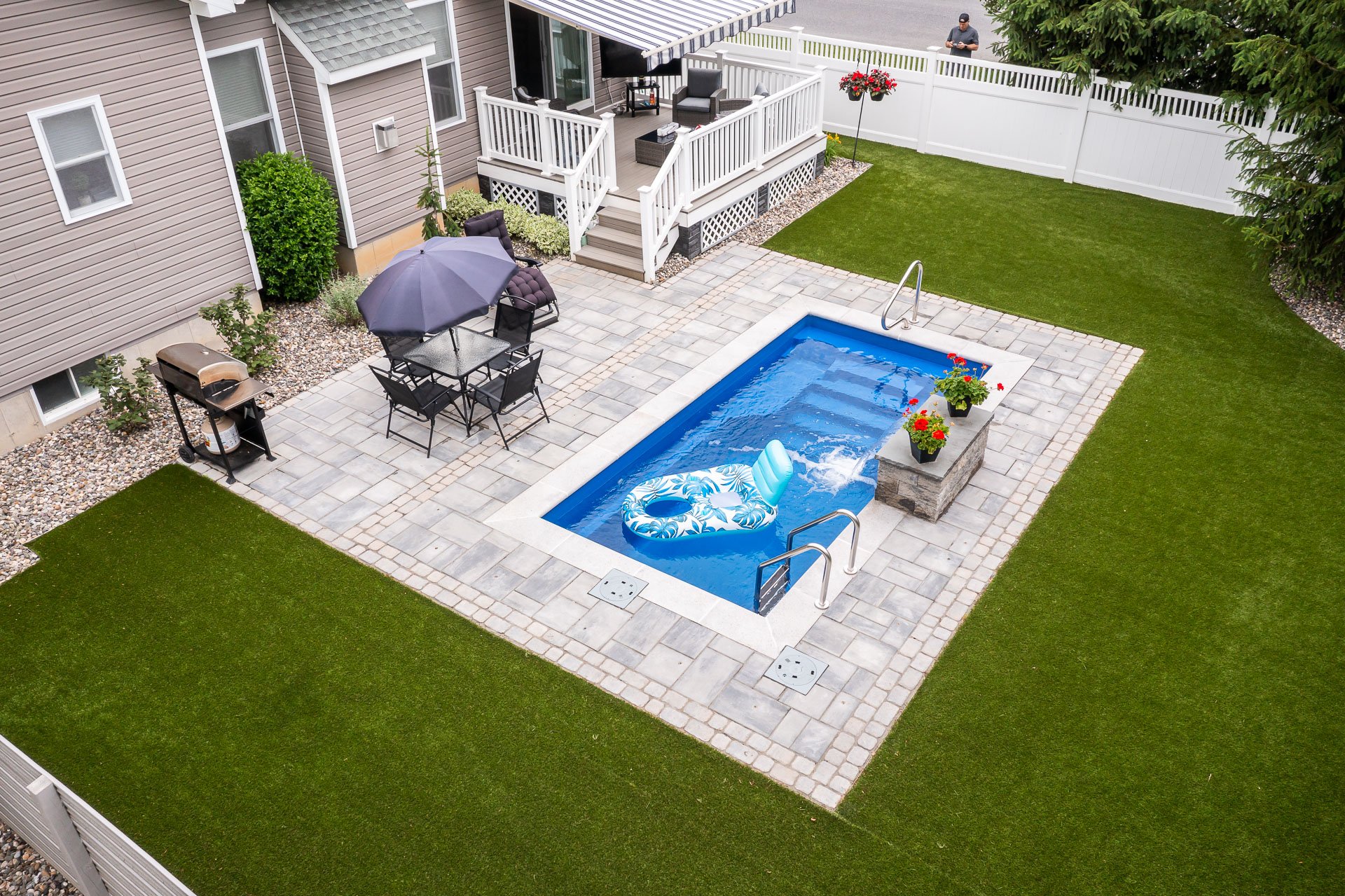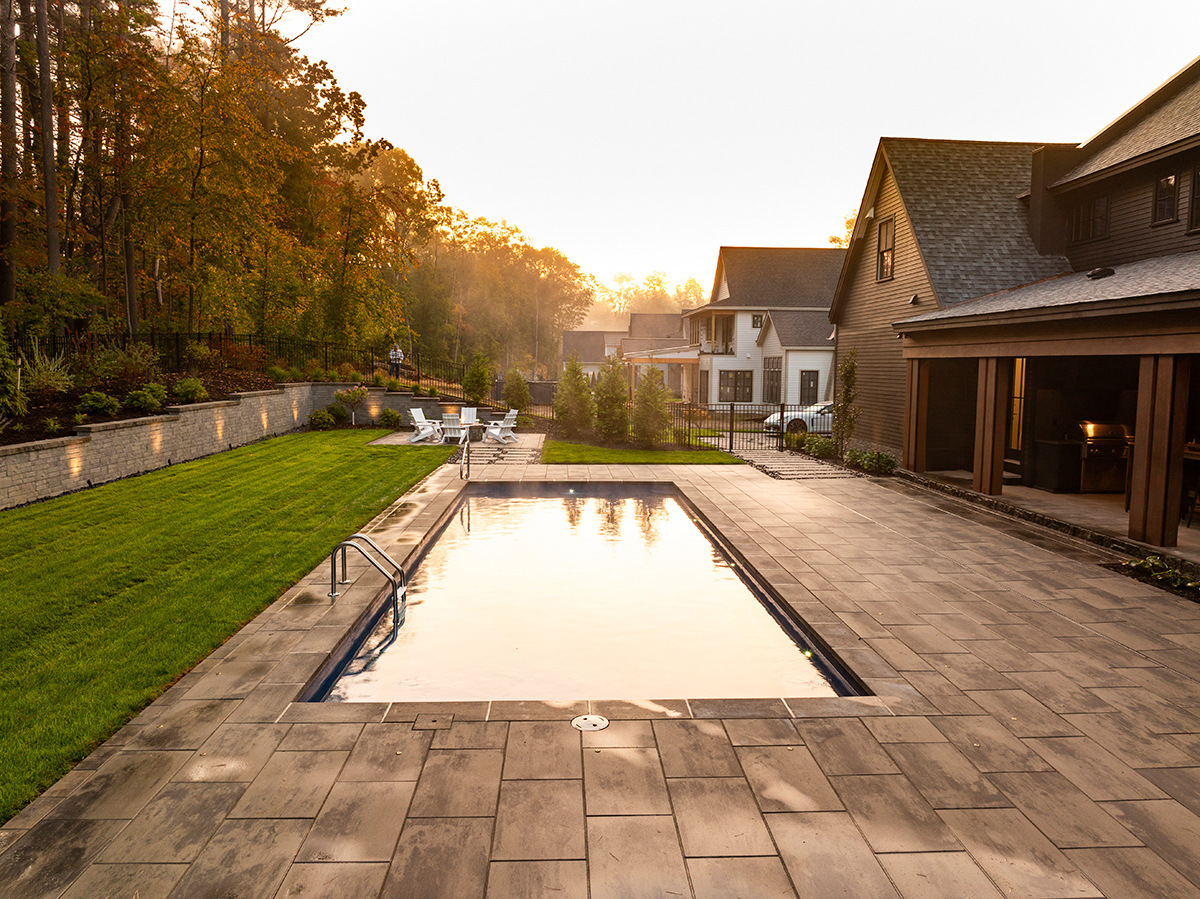
Written by: Carl Trinkle
9 min read
Equipping your Capital Region home with a pool can truly transform your property, your experience, and, dare we say, your life. In fact, installing a backyard pool is one of the most significant additions you can make to your home, elevating it to new levels of relaxation, enjoyment, and fun, not to mention aesthetic beauty.
If you are considering pool design and installation in the Capital Region and cities such as Saratoga Springs, Albany, and Clifton Park, you know that there are a myriad of options to choose from that can shape your outdoor oasis.
Among those decisions is one that many people overlook until they are in the deep end of the process: should you invest in a saltwater or chlorine pool?
There are advantages and disadvantages to both, so we’re here to guide you through the decision and ensure that you choose the right path for you in the saltwater pool vs chlorine debate.
Jump to:
Saltwater of Chlorine Pool?
The Basics of Saltwater and Chlorine Pools
Are Saltwater Pools Easier to Maintain?
Swimming in Saltwater vs Chlorine Pools
Common Misconceptions About Saltwater Pools
Pool Considerations for the Capital Region Climate
Frequently Asked Questions
Choosing a Pool Installer in the Capital Region of New York
Saltwater or Chlorine Pool? Choosing the Right Pool for Your Capital Region Property
Certain features of your future pool are sure to steal the spotlight during the design phase. Determining the type of pool to install (fiberglass, concrete, or vinyl), the features to implement along the way (fountains, bubblers, and more), and even the area surrounding your new pool (decking, outdoor living spaces, and so on) can dominate the conversation.
All of those aspects of pool design and installation are important, but when it comes to actually using your pool and keeping up with the maintenance, the type of water you choose makes all the difference.
Weighing the saltwater pool benefits against the advantages of chlorine, being realistic about your intended use, and considering the maintenance demands of each is essential.
The Basics of Saltwater and Chlorine Pools
Unless you have spent time in both types of pools, the impact of opting for a saltwater pool vs chlorine might seem insignificant. The truth is that there is a notable difference between the two, both in the swimming experience and in the required upkeep each demands.
Chlorine Pool Basics and Maintenance
Chlorine is what most people are probably familiar with, as it has been commonplace in pools for decades. To maintain these pools, chlorine is added directly to the water in order to sanitize the pool and keep it clean and safe for use.
Typically, chlorine is added via granules, liquid, or tablets on a regular schedule. This ensures that levels stay correct and the pool remains in perfect swimming condition.
Unfortunately, chlorine pools can feel harsh. They can irritate sensitive skin, bother your eyes, and even discolor your hair and clothing. Additionally, they might be more affordable to install, but the cost of chemicals accumulates over time, leading to a potentially frustrating financial burden.
Saltwater Pool Benefits and Basics
Chlorine pools are less expensive to install than saltwater pools, and there’s a good reason for that discrepancy. Saltwater pools use a generator that, through scientific magic called electrolysis, converts salt into chlorine.
In other words, both pools use chlorine as the primary chemical to sanitize the water and keep everything in working condition; they just go about it in different ways.
Why bother with the extra step of electrolysis, you ask? There are numerous saltwater pool maintenance and use advantages that make this additional expense worth it in the long run for some pool lovers.
First, saltwater pools do not require frequent chemical dumps to maintain the right level of chlorine in the water. The generator continuously converts salt into chlorine, maintaining perfect levels at all times.
Second, salt is much less expensive than other chemicals. Over time, the use of salt instead of chlorine can help justify the upfront cost of a saltwater pool, and even exceed the savings a chlorine pool installation would have offered.
Finally, many people prefer the experience of swimming in saltwater pools. Instead of harsh, the water can feel softer and less irritating. This makes swimming more pleasant, especially for kids and people with sensitive eyes or skin.
Are Saltwater Pools Easier to Maintain?
The advantages of saltwater pools are many, especially for people who prefer the swimming experience. When it comes to saltwater pool maintenance, the difference can truly shine, especially in terms of your pool maintenance budget.
The salt chlorinator used in saltwater pools supplies a consistent amount of chlorine to the water. This means that you do not need to worry about fluctuations in chemicals, frequent water tests, or adding chemicals on a regular basis.
Another benefit of this automated system is that you do not need to handle chemicals. There’s no need to buy, store, touch, or otherwise mess with harsh chlorine tablets or liquid chlorine that could spill.
Before you commit to a saltwater pool, however, note that they still require maintenance; it’s just different from a chlorine pool. You will need to:
- Test the water regularly to ensure the system is working
- Measure the salt level so that the generator can function properly
- Maintain your salt generator and related equipment
- Replace either parts of the generator or the entire unit as needed
Swimming in Saltwater vs Chlorine Pools
Chlorine pools are common, and there’s nothing inherently bad about opting for one and enjoying it. However, there’s no question that one advantage of saltwater pools is that they are generally more pleasant to use and enjoy.
The reason for this is the steady levels of chlorine and reduced reliance on harsh chemical spikes to achieve sanitation. The result is a less pungent smell, a lower likelihood of eye and skin irritation, and better feeling water.
In other words, if you are prioritizing the experience of swimming in your pool, especially with high use or sensitive swimmers (like children), a saltwater pool is probably your best option.
Common Misconceptions About Saltwater Pools
Many people consider saltwater pool benefits and elevate this type of pool into the perfect alternative to chlorine. While opting for a saltwater pool vs chlorine does come with some tremendous advantages, there are a few misconceptions that are widely accepted, including the idea that saltwater pools eliminate all of the troubles that accompany chlorine.
First and foremost, saltwater pools do use chlorine; they just go about it in a different way. The special generator used in saltwater pools chemically converts salt into chlorine; so, while saltwater pools do not require frequent chemical additions, they do rely on chlorine for sanitization.
Another common saltwater pool misconception is that saltwater pool maintenance is easy or practically nonexistent. While you do avoid the frequent addition and handling of chemicals with a saltwater pool, you will still need to take meticulous care of it. This includes the basics, like brushing and skimming, as well as more technical maintenance, such as testing chemical and salt levels, cleaning the salt cells in the generator, and occasionally replacing hardware to keep that generator working properly.
Pool Considerations for the Capital Region Climate
It is easy to get bogged down in the minute details of your pool design and installation in the Capital Region and cities such as Saratoga Springs, Albany, and Clifton Park. You want to ensure that your investment turns out to be exactly how you envisioned it, and the details matter.
However, it’s important to be aware of certain factors when considering a pool in New York. Otherwise, all of your dreaming and scheming could be derailed by regional considerations you didn't know about. With that in mind, here are a few of the key pool considerations you should know about in the Capital Region’s unique climate, whether you choose saltwater or chlorine.
- Opening and closing your pool seasonally is a must to protect your investment and ensure it doesn’t incur any damage during freeze and thaw cycles. Typically, you will want to drain your pool sometime in the Fall, likely by October. Once spring comes calling, you can reopen your pool. Wait for the temperature to reach the mid-60s consistently!

- If you want to use your pool during the cooler months, opting for heaters or other temperature-changing features will do the trick. Solar covers, wind screens, and other options can also help keep your pool more comfortable as the weather shifts.
- Before winter strikes, remove all water from the pipes and winterize any water that is left. You should also opt for insulated pipes. Exposed pipes are just asking for trouble!
- Choose durable construction materials installed by a reputable local pool company. The freeze and thaw cycles of New York’s Capital Region can be rough on subpar materials, leading to cracks and other potentially devastating damage.
FAQ: What Type of Pool is Better for You?
Choosing a saltwater pool vs chlorine is not as straightforward as it may initially seem. Everyone has different use scenarios, preferences, and budgets. If you’re looking for a succinct guide to determine whether you should choose a saltwater or chlorine pool, the FAQs below can provide valuable insight.
Is comfort in the water a priority?
If so, the softer, less irritating water associated with saltwater pools is for you.
Do you prefer minimal maintenance?
Saltwater pools are less involved to maintain, so you do not have to invest as much time and labor into keeping them clean and functional.
Does your budget allow for higher upfront costs?
While chlorine pools might cost more in the long run, saltwater pools do require more of an initial investment.
Choosing a Pool Installer in the Capital Region of New York
At the end of the day, the type of pool you choose for your Capital Region property should complete your backyard oasis and be a worthy centerpiece of your outdoor living space. To ensure that the results match your vision and investment, we recommend working with a local expert who can guide you through the design process, help you pick the perfect pool, and offer quality installation that will provide years of wonderful memories.
With decades of experience in the Capital Region, Gallivan is ready to help make your dream a reality. Fill out our consultation form today to discuss your backyard vision with a passionate, knowledgeable expert.






